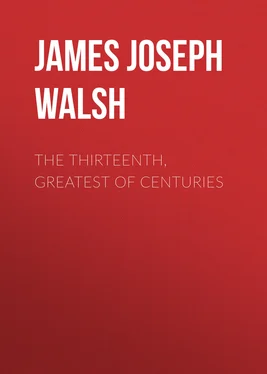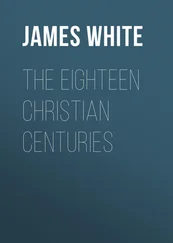James Walsh - The Thirteenth, Greatest of Centuries
Здесь есть возможность читать онлайн «James Walsh - The Thirteenth, Greatest of Centuries» — ознакомительный отрывок электронной книги совершенно бесплатно, а после прочтения отрывка купить полную версию. В некоторых случаях можно слушать аудио, скачать через торрент в формате fb2 и присутствует краткое содержание. Жанр: foreign_prose, История, foreign_edu, foreign_antique, на английском языке. Описание произведения, (предисловие) а так же отзывы посетителей доступны на портале библиотеки ЛибКат.
- Название:The Thirteenth, Greatest of Centuries
- Автор:
- Жанр:
- Год:неизвестен
- ISBN:нет данных
- Рейтинг книги:3 / 5. Голосов: 1
-
Избранное:Добавить в избранное
- Отзывы:
-
Ваша оценка:
- 60
- 1
- 2
- 3
- 4
- 5
The Thirteenth, Greatest of Centuries: краткое содержание, описание и аннотация
Предлагаем к чтению аннотацию, описание, краткое содержание или предисловие (зависит от того, что написал сам автор книги «The Thirteenth, Greatest of Centuries»). Если вы не нашли необходимую информацию о книге — напишите в комментариях, мы постараемся отыскать её.
The Thirteenth, Greatest of Centuries — читать онлайн ознакомительный отрывок
Ниже представлен текст книги, разбитый по страницам. Система сохранения места последней прочитанной страницы, позволяет с удобством читать онлайн бесплатно книгу «The Thirteenth, Greatest of Centuries», без необходимости каждый раз заново искать на чём Вы остановились. Поставьте закладку, и сможете в любой момент перейти на страницу, на которой закончили чтение.
Интервал:
Закладка:
Compayré's discussion of the "Causes of the Ignorance" of the Middle Ages in the next paragraph, is one of the most curious bits of special pleading by a man who holds a brief for one side of the question, that I think has ever been seen in what was to be considered serious history. He first makes it clear how much opposed the Christian Church was to education, then he admits that she did some things which cannot be denied, but minimizes their significance. Then he concludes that it was not the fault of the Church, but in this there is a precious bit of damning by faint praise. It would be impossible for any ordinary person who had only Compayré for authority to feel anything after reading the paragraph, but that Christianity was a serious detriment and surely not a help to the cause of progress in education. I quote part of the paragraph:
"What were the permanent causes of that situation which lasted for ten centuries? The Catholic Church has sometimes been held responsible for this. Doubtless the Christian doctors did not always profess a very warm sympathy for intellectual culture. Saint Augustine has said: It is the ignorant who gain possession of heaven (indocti coelum rapiunt.) Saint Gregory the Great, a Pope of the Sixth Century, declared that he would blush to have the holy word conform to the rules of grammar. Too many Christians, in a word, confounded ignorance with holiness. Doubtless, towards the Seventh Century, the darkness still hung thick over the Christian Church. Barbarians invaded the Episcopate, and carried with them their rude manners. Doubtless, also, during the feudal period the priest often became a soldier, and remained ignorant. It would, however, be unjust to bring a constructive charge against the Church of the Middle Age, and to represent it as systematically hostile to instruction. Directly to the contrary, it is the clergy who, in the midst of the general barbarism, preserved some vestiges of the ancient culture. The only schools of that period are the Episcopal and claustral schools, the first annexed to the Bishops' palaces, the second to the monasteries. The religious orders voluntarily associated manual labor with mental labor. As far back as 530, St. Benedict founded the Convent of Monte Cassino, and drew up statutes which made reading and intellectual labor a part of the daily life of the monks." When this damning by faint praise is taken in connection with the paragraph in which only a single monk at the Monastery of St. Gall is declared to have been able to read and write, the utterly false impression that is sure to result, can be readily understood even by those who are not sympathetic students of the Middle Ages. This is how our histories of education have been written as a rule, and as a consequence the most precious period in modern education, its great origin, has been ignored even by professional scholars, to the great detriment not only of historical knowledge but also of any proper appreciation of the evolution of education.
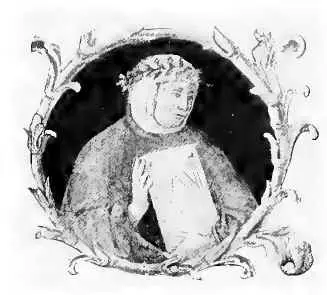
PETRARCA OMNIUM VIRTUTUM
MONARCA
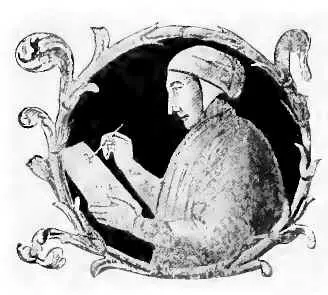
GIOTTO, PICTOR EXIMIUS
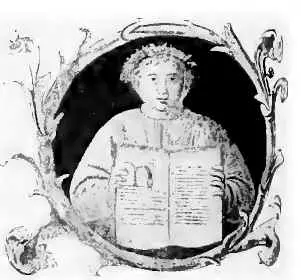
DANTE THEOLOGUS NULLIUS
DOGMATIS EXPERS
It will be said by those who do not appreciate the conditions that existed in the Middle Ages, that these numbers at the universities seeking the higher education, mean very little for the culture of the people, since practically all of those in attendance at the universities belonged to the clerical order. There is no doubt that most students were clerics in the Thirteenth Century. This did not mean, however, that they had taken major orders or had in any way bound themselves irrevocably to continue in the clerical vocation. The most surprising thing about the spread of culture and the desire for the higher education during the Thirteenth Century, is that they developed in spite of the fact that the rulers of the time were all during the century, embroiled in war either with their neighbors or with the nobility. Anyone who wanted to live a quiet, intellectual life turned naturally to the clerical state, which enabled him to escape military duties and gave him opportunities for study, as well as protection from many exactions that might otherwise be levied upon him. The church not only encouraged education, but supplied the peaceful asylums in which it might be cultivated to the heart's content of the student.
While this clerical state was a necessity during the whole time of residence at the university, it was not necessarily maintained afterward. Many of the clerics did not even have minor orders—orders which it is well understood carry with them no absolute obligation of continuing in the clerical state. Sextons and their assistants were clerics. When the word canon originally came into use it meant nothing more than that the man was entered on the rolls of a church and received some form of wages therefrom. Students at the universities were by ecclesiastical courtesy then, clerics (from which comes the word clerk, one who can read and write) though not in orders, and it was because of this that the university was able to maintain the rights of students. It was well understood that after graduation men might take up the secular life and indeed most of them did. In succeeding chapters we shall see examples of this and discuss the question further. Professors at the universities had to maintain their clerical condition so that even professors of law and of medicine were not allowed to marry. This law continued long beyond the Thirteenth Century, however. Professors of medicine were the first to be freed from the obligation of celibacy, but not until the middle of the Fifteenth Century at Paris, while other professors were bound thus for a full century later. Certain minor teaching positions at Oxford are still under this law, which evidently has seemed to have some advantage or it would not have been maintained.
It might perhaps be thought that only the wealthier class, the sons of the nobility and of the wealthy merchants of the cities had opportunities at the universities. As a matter of fact, however, the vast majority of the students was drawn from the great middle class. The nobility were nearly always too occupied with their pleasures and their martial duties to have time for the higher education. The tradition that a nobleman should be an educated gentleman had not yet come in. Indeed many of the nobility during the Thirteenth Century rather prided themselves on the fact that they not only had no higher education, but that they did not know even how to read and write. When we reflect, then, on the large numbers who went to the universities, it adds to our surprise to realize that they were drawn from the burgher class. It is evident that many of the sons even of the poor were afforded opportunities in different ways at the universities of the time.
Tradition shows that from the earliest time there were foundations on which poor students could live, and various arrangements were made by which, aside from these, they might make their living while continuing their studies. Working one's way through the university was more common in the Thirteenth Century than it is at the present day, though we are proud of the large numbers who now succeed in the double task of supporting and educating themselves, with excellent success in both enterprises. There are many stories of poor students who found themselves about to be obliged to give up their studies, encountering patrons of various kinds who enabled them to go on with their education.
Читать дальшеИнтервал:
Закладка:
Похожие книги на «The Thirteenth, Greatest of Centuries»
Представляем Вашему вниманию похожие книги на «The Thirteenth, Greatest of Centuries» списком для выбора. Мы отобрали схожую по названию и смыслу литературу в надежде предоставить читателям больше вариантов отыскать новые, интересные, ещё непрочитанные произведения.
Обсуждение, отзывы о книге «The Thirteenth, Greatest of Centuries» и просто собственные мнения читателей. Оставьте ваши комментарии, напишите, что Вы думаете о произведении, его смысле или главных героях. Укажите что конкретно понравилось, а что нет, и почему Вы так считаете.
